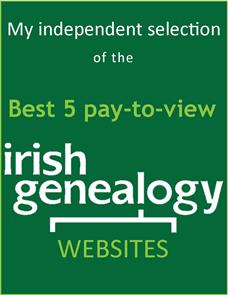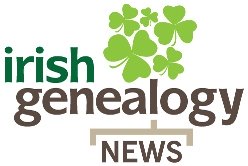- Home ›
- Irish genealogy A-Z ›
- Free Newspaper Archives
Free Irish Newspaper Archives
Where to find old Irish newspapers online and offline
Free
Irish newspaper archives are not as scarce as you might imagine. A few are even
online, and you can search from home quite merrily without reaching for your wallet. However, the
majority of free-to-access collections of old Irish papers still require a visit to a library or specialist institution.
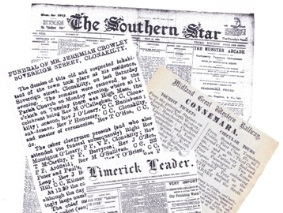
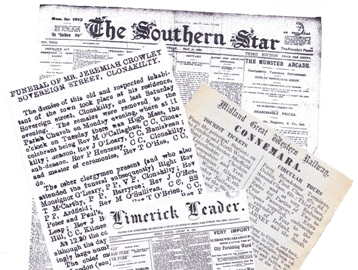
Online or offline, if the collections are free their content is rarely fully digitised so they come with no index. This means you need to have a pretty clear idea of the relevant date and geographical area where the information you are seeking is likely to have been published.
Searching old Irish newspapers page by page, whether on microfilm or hard copy, can be very time-consuming. On the plus side, browsing old newspapers can be distracting and enjoyable as you come across all manner of stories, adverts, obituaries and comment.
Not only can these pass on a flavour of the times through which our ancestors lived, they can often be amusing and, of course, simply educational.
This page is split into Offline collections and Online collections.
Old Irish newspapers – major OFFLINE collections
The British Library holds the single largest collection of Irish newspapers and other periodicals. This collection is more or less complete since 1826 but the Library also has an extensive archive of earlier publications. (The British Newspaper Archive is the online, pay-to-view arm of the Library. See 'Irish newspaper archives (Pay to view)' in the Related Pages box, above right.)
The British Library's newspaper collection is no longer available at its long-time home in north London. It can now be accessed by personal visitors to its state-of-the-art archive in Boston Spa, Yorkshire. See 'Latest News', right.
The British Library holds the single largest collection of Irish newspapers and other periodicals. This collection is more or less complete since 1826 but the Library also has an extensive archive of earlier publications. (The British Newspaper Archive is the online, pay-to-view arm of the Library. See 'Irish newspaper archives (Pay to view)' in the Related Pages box above.)
The British Library's newspaper collection is no longer available at its long-time home in north London. It can now be accessed by personal visitors to its state-of-the-art archive in Boston Spa, Yorkshire. Details.
Toolkit Search Tip
The NEWSPLAN project started around 30 years ago with the aim of preserving fragile UK and Irish historical newspapers while still making their content available via microfilm.
The searchable NEWSPLAN database lists all papers published on the island, and specifies in which archives (UK and IE) they can be found. As such, it has become a useful bibliographic resource for family historians and other researchers.
The National Library of Ireland has the largest Irish newspaper archives in Ireland itself. It isn't complete, but it's still a huge collection, and it covers Northern Ireland, too. You can search its database (see NEWSPLAN box ) by either newspaper title or by location, but to view the newspapers you have to visit Kildare Street, in Dublin.
Newspapers are made available to researchers on microfilm; only if there is no microfilm is access given to hard copy.
Local
libraries and archives: Most local libraries in Ireland, or their
county local studies
departments, will have a collection of newspapers available for viewing
in
either hard copy or on microfilm. The time spans will vary, but may be
surprisingly extensive. Many branch libraries in the Republic of Ireland
also provide free access to the Irish Newspaper Archives database.
Although the National Library should, by law, receive a copy of all publications produced in Ireland, some historical copies didn't make the journey to Dublin and are still held locally. It is, therefore, always worth checking with the local librarian/archivist.
Dublin City Library & Archive also has an extensive holding of publications that include many of Ireland's one-time national titles as well as regional titles. You can download the pdf list here. Most of the collection can be viewed on microfilm at the Pearse Street, Dublin premises.
PRONI no longer takes recently published materials on deposit but it still holds a significant collection of 19th-century titles, mostly on microfilm, that can be viewed in its offices in the Titanic Quarter of Belfast. The full list of its microfilm holding can be downloaded here as a pdf or search for specific titles in the Newsplan database (see link in box above).
Universities and county libraries and archives: Most county repositories and universities have old Irish newspaper archives for their area. Galway county library, is fairly typical in having quite an extensive list (link not working at present). The majority won't have any online access so you'll need to visit the institutions in person. Mostly these papers are made available on microfilm but you may find you can view the hard copy, too.
Toolkit Search Tip
The NEWSPLAN project started around 30 years ago with the aim of preserving fragile UK and Irish historical newspapers while still making their content available via microfilm.
The searchable NEWSPLAN database lists all papers published on the island, and specifies in which archives (UK and IE) they can be found. As such, it has become a useful bibliographic resource for family historians and other researchers.
The National Library of Ireland has the largest Irish newspaper archives in Ireland itself. It isn't complete, but it's still a huge collection, and it covers Northern Ireland, too. You can search its database (see NEWSPLAN box ) by either newspaper title or by location, but to view the newspapers you have to visit Kildare Street, in Dublin.
Newspapers are made available to researchers on microfilm; only if there is no microfilm is access given to hard copy.
Local
libraries and archives: Most local libraries in Ireland, or their county local studies
departments, will have a collection of newspapers available for viewing in
either hard copy or on microfilm. The time spans will vary, but may be
surprisingly extensive. Many branch libraries in the Republic of Ireland also provide free access to the Irish Newspaper Archives database.
Although the National Library should, by law, receive a copy of all publications produced in Ireland, some historical copies didn't make the journey to Dublin and are still held locally. It is, therefore, always worth checking with the local librarian/archivist.
Dublin City Library & Archive also has an extensive holding of publications that include many of Ireland's one-time national titles as well as regional titles. You can download the pdf list here. Most of the collection can be viewed on microfilm at the Pearse Street, Dublin premises.
PRONI no longer takes recently published materials on deposit but it still holds a significant collection of 19th-century titles, mostly on microfilm, that can be viewed in its offices in the Titanic Quarter of Belfast. The full list of its microfilm holding can be downloaded here as a pdf or search for specific titles in the Newsplan database (see link in box above).
Universities and county libraries and archives: Most county repositories and universities have old Irish newspaper archives for their area. Galway county library, is fairly typical in having quite an extensive list (link not working at present). The majority won't have any online access so you'll need to visit the institutions in person. Mostly these papers are made available on microfilm but you may find you can view the hard copy, too.
Free Irish newspaper archives: ONLINE collections
London, Dublin, Belfast Gazettes: While these publications are not newspapers in the traditional sense, they fall into the category by virtue of their origins as the official 'news' outlet for the Government since the late 17th century. The London Gazette and the Belfast Gazette are free to view online here and are easy to search.
The London Gazette should not be overlooked as a potential source of Irish family history; it holds a lot of information about Irish men and women in its announcements of civil service examination successes and appointment listings, insolvencies, probate, legalised name changes, military honours etc.
The archives of the Dublin Gazette, which was replaced by Iris Oifigiúil in 1922, are available on microfilm (18th century) or hard copy at the National Library, but are not online.
London,
Dublin, Belfast Gazettes: While these publications are not newspapers in the traditional sense, they fall into the
category by virtue of their origins as the official 'news' outlet for the
Government since the late 17th century.
Both the Irish Newspaper Archives and the Irish Times Archive – Ireland's two main pay-to-view online newspaper collections – are available for free searching in many of the island's libraries.
The London Gazette and the Belfast Gazette are free to view online here and are easy to search.
The London Gazette should not be overlooked as a potential source of Irish family history; it holds a lot of information about Irish men and women in its announcements of civil service examination successes and appointment listings, insolvencies, probate, legalised name changes, military honours etc.
The archives of the Dublin Gazette, which was replaced by Iris Oifigiúil in 1922, are available on microfilm (18th century) or hard copy at the National Library, but are not online.
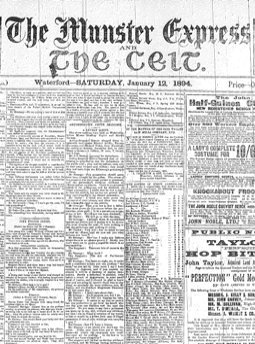
An Index
to the Belfast Newsletter was put together by John C Greene and it is
available for free searching on the University of Louisiana website.
The 300,000 items on the database spans 1737–1800, but there are gaps, most
notably in the period to 1750, when only about one-quarter of the pages
published have survived.
Northern Ireland Extracts: Eddie's Extracts is the (hard) work of genealogist Eddie Connolly. The free to search database holds births, marriages and death reports from the Belfast Newsletter, the Banner of Ulster, The Witness, Belfast Weekly News, the Northern Whig and many more regional titles, as well as court and inquest reports, subscriptions lists and many other items of general historic and social interest. The earliest transcriptions date from 1825 so if your ancestors came from the northern counties, you really must check this site out.
Nick Reddan's Newspaper Extracts (here) carries a mixed bag of curios, as well as birth, marriage and death announcements and other news stories. They have been transcribed from various Irish newspapers from 1720 to 1865 and are sorted by family name. It had 27,236 entries (at July 2022), it's worth dipping into for the chance of discovering some genealogical details or simply to enjoy some of the weird and wonderful tales Nick's uncovered.

Both the Irish Newspaper Archives and the Irish Times Archive – Ireland's two main pay-to-view online newspaper collections – are available for free searching in many of the island's libraries.
Ireland Old News: This free online database holds newspaper transcriptions from most Irish counties (only Carlow. Laois, Longford, Westmeath and Wexford are not represented). The years and extent of coverage varies considerably.
County and University libraries and archives: At a local level, most old Irish newspapers collections are made available as hard copy or on microfilm, so personal visits are required.
As far as I'm aware, outside of Dublin only Waterford County Archive has digitised its local papers and made some of them available online, free. Visitors to any of Roscommon's libraries are also well served, with a great range of digitised local and national newspapers available to search, free, at any library in the county.

